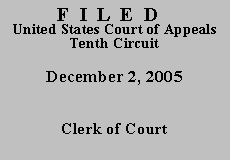

| UNITED STATES OF AMERICA, | |
| Plaintiff-Appellee, | |
| v. | |
| KAI HAMPTON, | |
| Defendant-Appellant. |
Before EBEL, McKAY, and HENRY, Circuit Judges.
This is a pro se 28 U.S.C. § 2255 appeal. Appellant pled guilty to possession of a controlled substance with intent to distribute, in violation of 21 U.S.C. § 841(a)(1). Subsequently, Appellant filed a motion to vacate, set aside, or correct his federal sentence with the district court. In his motion, Appellant alleged that his sentence was illegal based on the Supreme Court's recent decision in Blakely v. Washington, 542 U.S. 296 (2004). The district court denied Appellant's motion, holding that Blakey cannot be retroactively applied to § 2255 motions. The district court did not act on the issue of certificate of appealability. Under these circumstances, we deem the certificate of appealability to have been denied at the district court level. Appellant then filed a letter with this court which has been docketed as an application for a certificate of appealability. The issues he raises on appeal are not identical to those he raised to the district court. Appellant continues to claim that his sentence was illegal under Blakely, but on appeal he also alleges that his counsel was ineffective for failing to make the appropriate Blakely-type objections at either the sentencing hearing or on direct appeal.
In order for this court to grant a certificate of appealability, Appellant must make a "substantial showing of the denial of a constitutional right." 28 U.S.C. § 2253(c)(2). To do so, Appellant must demonstrate "that reasonable jurists could debate whether (or, for that matter, agree that) the petition should have been resolved in a different manner or that the issues presented were adequate to deserve encouragement to proceed further." Slack v. McDaniel, 529 U.S. 473, 484 (2000) (quotations omitted).
While the district court's holding in this case could be supported by our decision in United States v. Price, 400 F.3d 844, 845 (10th Cir. 2005), where we held that Blakely does not apply retroactively to initial § 2255 motions, Price is not applicable here because Appellant was not sentenced until after Blakely was decided. Appellant's Blakely argument therefore does not need to be applied retroactively. Instead, the proper issue to be resolved in this case is whether counsel's failure to object on Blakely grounds at sentencing and on direct appeal amounted to ineffective assistance. Strickland v. Washington, 466 U.S. 668 (1984).
Appellant's claim that his sentence was enhanced because of the use of his prior convictions is a misunderstanding of the law; the Supreme Court's decision in Almendarez-Torres v. United States, 523 U.S. 224 (1998), makes it clear that prior convictions do not apply to Blakely. Therefore, Appellant's counsel's failure to object under Blakely was not error.
We have carefully reviewed Appellant's brief, the district court's disposition, and the record on appeal. Because Appellant has failed to demonstrate that he is prejudiced by his counsel's failure to object on Blakely grounds, no reasonable jurist could conclude that Appellant's counsel was ineffective under Strickland.
Accordingly, Appellant has failed to show a denial of a constitutional right as required by 28 U.S.C. § 2253(c)(2), and we must DENY his request for a certificate of appealability and DISMISS the appeal.
Entered for the Court
Monroe G. McKay
Circuit Judge
*. This order is not binding precedent, except under the doctrines of law of the case, res judicata, and collateral estoppel.